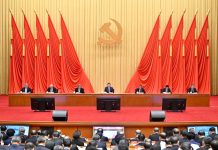BEIJING: The Chinese government will roll out a set of fiscal and financial policies, including allocating more local government bond quota in advance as per due procedures, and intensifying inclusive financial support to micro, small and medium-sized enterprises.
Fiscal and monetary policies will be further leveraged to expand domestic demand, assist businesses reopening, sustain employment, and help all types of businesses to weather this difficult time.
Related plans were made at the State Council’s executive meeting chaired by Premier Li Keqiang on Tuesday.
The Chinese government puts great emphasis on intensifying counter-cyclical macro-policy adjustment to advance both the epidemic control and economic and social development. Premier Li Keqiang stressed the need for local government bonds to be expeditiously issued and the funds raised properly utilized to catalyze effective investment.
The meeting underscored the need to scale up special local government bonds and expand effective investment in areas of weakness. On top of this year’s local government bond quota already made available, more of such quota will be expeditiously allocated in advance as per due procedures. Such funding will be directed to where the projects are. It will thus prioritize regions with key projects, low risks and the prospect of quickly boosting effective investment and will be channeled to expedite those projects and livelihood programs.
Localities across the country will be asked to bring forward the issuance of these bonds and endeavor to get the job done before the end of the second quarter of this year.
“It is essential to make well-calibrated arrangements in advance to keep the projects under construction going, and launch some new projects in light of real needs,” Li said.
The meeting adopted stronger measures to offer inclusive financial support to micro, small and medium-sized enterprises. Since the start of this year, the People’s Bank of China has allocated a 300 billion yuan (about 43 billion U.S. dollars) special re-lending quota, which has so far supported more than 7,000 key enterprises involved in the outbreak response.
Another 500 billion yuan of re-lending and re-discount quota is now supporting an increasing number of micro, small and medium-sized firms to get loans at rates below 4.55 percent for their business re-opening.
“Smaller businesses have been hit the hardest by the outbreak. Their restart of operation affects the entire industrial chain and is vitally important for keeping employment stable. The government must promptly roll out support measures that benefit them all,” Li said.
It was decided at the meeting that for small and medium-sized banks, re-lending and re-discount quota will be increased by one trillion yuan. Targeted cuts in the required reserve ratio will be further implemented to encourage these banks to funnel all the newly-obtained funding in the form of loans at concessional rates to micro, small and medium-sized enterprises, who are great in number and cover many sectors. The agricultural and foreign trade sectors and sectors heavily affected by the outbreak will get greater loan support.
Financial institutions be will be supported in issuing 300 billion yuan of financial bonds to be used as loans exclusively targeting small firms.
The meeting called for an increase of one trillion yuan over the previous year in the net financing from corporate credit-backed bonds to expand low-cost financing channels for private and smaller businesses. –Agencies






